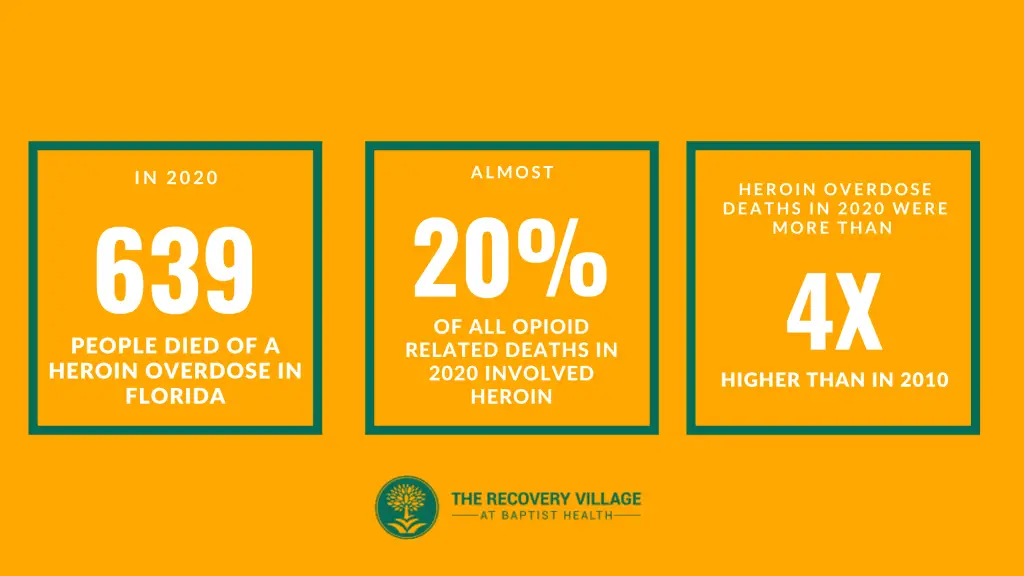Seeking treatment for heroin addiction can increase your chances of successfully recovering from the dangerous long-term effects of heroin misuse.
Heroin is a highly addictive drug classified as an illegal opioid. Heroin and prescription opioids have been linked to an alarmingly high number of drug overdose deaths. The CDC estimates about 130 Americans die every day from opioid overdoses. Heroin addiction has affected people from all demographics.
Fortunately, heroin addiction treatment is available and can help people overcome addiction once and for all.

Heroin Addiction Overview
Heroin is an illicit opioid and a Schedule I controlled substance, meaning it has no medical use and has a high risk for addiction, abuse and dependence. Heroin works by triggering the brain’s mu-opioid receptors and reward circuit, leading to a quick high that paves the way for addiction.
Treatment Can Be Life Changing. Reach out today.

When discussed by dealers, heroin is rarely called heroin. Instead, dealers will talk about the substance using heroin street names. Some street names for heroin include:
- Big H
- Black Tar
- Chiva
- Hell Dust
- Horse
- Negra
- Smack
- Thunder
Heroin from drug dealers is rarely pure. Heroin is cut with many different substances. Some are harmless, and others can be lethal. Some common items include:
- Baking Soda
- Talcum Powder
- Fentanyl — a synthetic opioid that is 50–100 times more potent than morphine by weight and has been linked to many fatal overdoses
- Caffeine
- Flour
- Sugar
- Baby Formula
- Laundry Detergent
- Diphenhydramine — an allergy medicine that decreases the itching sensation sometimes felt with heroin injections
Heroin Side Effects
Heroin has many short-term side effects, such as:
- Initial euphoria or “rush”
- Sleepiness
- Slowed breathing
- Pinpoint pupils
- Nausea
- Warm flushing of the skin
- Dry mouth
- Feeling heavy
Long-term side effects of heroin use, including addiction, are also possible.
Long-term Side Effects of Heroin Addiction
Besides its short-term side effects, heroin also carries long-term risks. These include:
- Addiction
- Overdose
- Long-term structural and hormonal changes in the brain
- Poor decision-making abilities
- Poor emotional regulation
- Poor responses to stress
Heroin overdose symptoms include:
- Slow or shallow breathing
- Blue lips or fingernails
- Clammy skin
- Seizures
- Coma
- Death
If you suspect someone is overdosing on heroin, you should give naloxone (Narcan) immediately and call 911. Heroin overdoses are common, and 639 Floridians died of a heroin overdose in 2020.
Signs of Heroin Addiction
When someone starts to struggle with an opioid like heroin, indications of addiction often emerge. Although not everyone will have all characteristics, having at least two signs can indicate an addiction:
- Taking more heroin or for longer than intended
- Previous unsuccessful efforts to cut down or quit heroin
- Spending a lot of time obtaining, taking or recovering from heroin
- Cravings for heroin.
- Not meeting obligations at home, school or work because of heroin.
- Interpersonal or social problems from heroin use
- Giving up other activities because of heroin
- Using heroin even when it is physically dangerous to do so
- Continuing heroin even though you know that doing so is causing problems.
- Needing higher doses of heroin to achieve the same effects as before
- Withdrawal symptoms when you stop heroin
Treatment for Heroin Addiction
Many options for heroin addiction treatment exist, depending on where you are in the recovery process. Further, certain drugs may be used to help ease your withdrawal symptoms or cravings. Medical detox, rehab and medications are tailored to the person’s needs giving them the best chance of recovery.
Heroin Detox
Heroin detox or detoxification is necessary to completely clear heroin and its metabolites from your body. Trying heroin detox on your own at home can lead to unpleasant and dangerous withdrawal symptoms.
However, undergoing heroin detox in a medical facility (sometimes called medical detox) can help. In medical detox, your heroin withdrawal symptoms can be treated as they occur, leading to a much more comfortable withdrawal from heroin. Medication-assisted treatment (MAT) with methadone or buprenorphine-based products like Suboxone often starts in medical detox to help avoid withdrawal symptoms and cravings.
The biggest complication of heroin detox is the individual returning to drug use after a successful detox. This complication can be very dangerous because most opiate overdose deaths occur in people who have just detoxed. Withdrawal from heroin reduces an individual’s tolerance to the drug making it possible for people who completed detox to overdose on much smaller doses or amounts of heroin than they had used before with no issues.
Inpatient vs. Outpatient Treatment
Following medical detox, a person enters inpatient or outpatient rehab. Rehab should last at least 90 days. However, it can continue for much longer.
Residential rehab, also known as inpatient rehab, often immediately follows medical heroin detox. This kind of rehab mixes addiction treatment and support for medical issues. If you have underlying medical problems, time in inpatient rehab may address your medical needs and addiction. This rehab stage aims to create a safe place for you to recover. Benefits of this type of rehab include:
- Being able to focus on your recovery
- Getting rid of drug-use triggers
- Living in a safe place
- Having around-the-clock medical care
After residential rehab, you may be able to continue to outpatient rehab while living at home or in a sober living house. In outpatient rehab, you continue therapy one-on-one or in groups. Support groups may also be an option. While in outpatient rehab, you may be able to maintain a job and social responsibilities. Outpatient rehab may be an option when:
- You completed residential rehab
- You cannot take a break from outside life to deal with your heroin struggle
- You need privacy, as an absence from daily life may raise suspicions
- Your struggle with heroin is in the early stages
Rehab includes many components, such as medications and therapy. Therapy is an integral part of rehab. Studies show that therapy halves the risk of quitting a heroin treatment program. Therapy is important because it can:
- Teach you different attitudes about drug use
- Replace unhealthy life skills with healthy ones
- Reinforce your other treatments, like medicines
Rehab offers different types of therapy. Depending on your needs, you may participate in one or more of them during your recovery. They include:
- One-on-one counseling: In this type of therapy, you may set personal goals, discuss setbacks and celebrate progress.
- Cognitive-behavioral therapy: This therapy can teach you coping skills for stress. By learning to change negative thought patterns, your desire for opioids can decrease.
- Motivational enhancement therapy: This therapy may increase your resolve to keep to your treatment plan.
- Contingency management: This method can provide rewards for staying off drugs.
- Group counseling: In this kind of therapy, you hear from other people in similar situations. It can help you feel like you are not alone and other people struggle with the same things you do. You can learn from others in these sessions and support each other as you all work towards recovery.
- Family counseling: Family members and spouses are included in this therapy. Together, you can work to strengthen family bonds that your struggle with heroin may have tested.
Dual Diagnosis Treatment
Substance use and mental health are closely linked. Mental health issues are a major risk factor for quitting a heroin recovery program. Further, successfully addressing mental health problems is linked to success in long-term heroin recovery. Even if you stop taking heroin, mental health problems must still be treated. Otherwise, these problems continue and increase your risk.
People with mental health issues may need extra support in rehab. In dual diagnosis treatment, addiction and mental health problems are treated together. The required treatment length can differ by person. Common mental health issues that can be addressed are:
- Depression
- Personality disorder
- Bipolar disorder
- Autism
- Psychotic disorders
- Anxiety
- Eating disorders
- Attention-deficit/hyperactivity disorder
Medication-assisted Treatment for Heroin Withdrawal
Heroin use and addiction cause tolerance and physical dependence, which result in negative symptoms when the drug is withdrawn or withheld from the body. The symptoms are also known as withdrawal symptoms.
Common heroin withdrawal symptoms include:
- Nausea
- Insomnia
- Agitation
- Diarrhea
- Sweating
- Anxiety
- Muscle Aches
- Abdominal Cramping
- Heroin cravings
- Fever
- Goosebumps
- Excessive tear formation
Heroin withdrawal symptoms are frequently described as being similar to having the flu. The severity of withdrawal symptoms depends on multiple factors, including how long the individual used heroin, the amount of heroin they used and the method by which they used heroin.
Typically, heroin withdrawal symptoms may appear 8–12 hours after the last use, with symptoms peaking in severity between 48–72 hours after the last use. One of the most frequent concerns regarding heroin withdrawal is how long heroin withdrawal lasts. Typically heroin withdrawal symptoms clear after 7–10 days.
Medication-assisted treatment (MAT) is often used to fight withdrawal symptoms while you undergo medical detox. The gold standard MAT treatments are methadone and buprenorphine-based products:
Buprenorphine (Suboxone. Sublocade): This opioid is considered the best choice for moderate-to-severe withdrawal in most people. It can help withdrawal symptoms and lessen cravings. It is often combined with naloxone to reduce the risk of misuse. Buprenorphine can be used in medical detox and long-term opioid replacement therapy. It is most often prescribed as an oral film combined with naloxone under the brand name Suboxone. Buprenorphine is one of the most convenient MAT treatments, as regular pharmacies can dispense it.
Methadone (Methadose): This opioid can be used in both opioid withdrawal and opioid replacement therapy. It can stop cravings without causing a high. It can also block a high if you take heroin. Methadone for MAT cannot be obtained from regular pharmacies, and special methadone clinics must dispense it.
Heroin Addiction Medications
The cornerstone of heroin addiction treatment is MAT with methadone or buprenorphine-based products. However, besides these, other medications may help you during rehab. Some drugs may ease withdrawal symptoms. Others may reduce cravings and help achieve long-term sobriety.
- Vitamins: Vitamin C can improve withdrawal symptoms when used at high doses.
- Clonidine: Clonidine is an alpha-2 adrenergic agonist that can help moderate-to-severe withdrawal symptoms. It should not be used simultaneously with opioid replacement therapy.
- Naltrexone: This drug is an opioid blocker. It is not used during medical detox as it can worsen withdrawal symptoms. Further, it does not impact cravings. Rather, it is used when you have been free of opioids for at least a week. It works by blocking the high from opioids. Therefore, naltrexone is used to prevent relapse instead of treating withdrawal.
Ongoing Treatment and Relapse Prevention
The long-term success of rehab depends on your ability to hone the life skills you learned in rehab. Unfortunately, the stress of the outside world can often distract people from this goal. For this reason, aftercare is one of the most important parts of the recovery process. Aftercare can include:
- Support groups and 12-step programs
- Volunteering
- Alumni groups for rehab programs
- Faith-based programs
- Tests for infections like HIV
- Social work help
- Help finding a job
- Support in school
- Housing help
- Help with transportation
Further, a supportive living environment after rehab is key to recovery. Some people may benefit from living with others in a sober house after rehab. Studies have shown that living alone after rehab increases relapse risks.
About Our Heroin Addiction Treatment Center
About Our Heroin Addiction Treatment Center
The Recovery Village at Baptist Health offers a full continuum of programs to get you off heroin and keep you off the drug for good. This starts with medical detox, where you are weaned from heroin and may be put on medication-assisted treatment with buprenorphine if medically appropriate.
From there, we offer rehab options to teach you skills to lead a heroin-free life, including inpatient, outpatient and aftercare programs.
We accept several different insurance policies; check if we work with your insurance coverage here. Even if you don’t see your plan, please let us know; we don’t want to turn anyone away and will work with you as much as possible.
Our Facilities
We have two Florida facilities to choose from when you decide to come off heroin. Both offer a full continuum of heroin recovery treatment, including medical detox (with MAT, as medically appropriate), rehab treatment, dual diagnosis care and aftercare.
Our inpatient treatment facility, The Recovery Village Palm Beach, offers a full continuum of treatment programs with hotel-style rooms, nutritious meals, and amenities like basketball, volleyball, a swimming pool, two fully equipped gyms, and several lounges.
The Recovery Village Miami is our outpatient facility, centrally located in South Miami, with comfortable spaces and expert therapists to help you on the way to independence in recovery. Our Miami facility focuses on intensive outpatient and traditional outpatient levels of care.
Get the Help You Need Today
If you or a loved one struggles with heroin, you are not alone. Heroin addiction is powerful, but your addiction doesn’t need to win. You can overcome it. Our treatment program at The Recovery Village at Baptist Health can help: contact us today to learn more about how we can help you overcome heroin.











